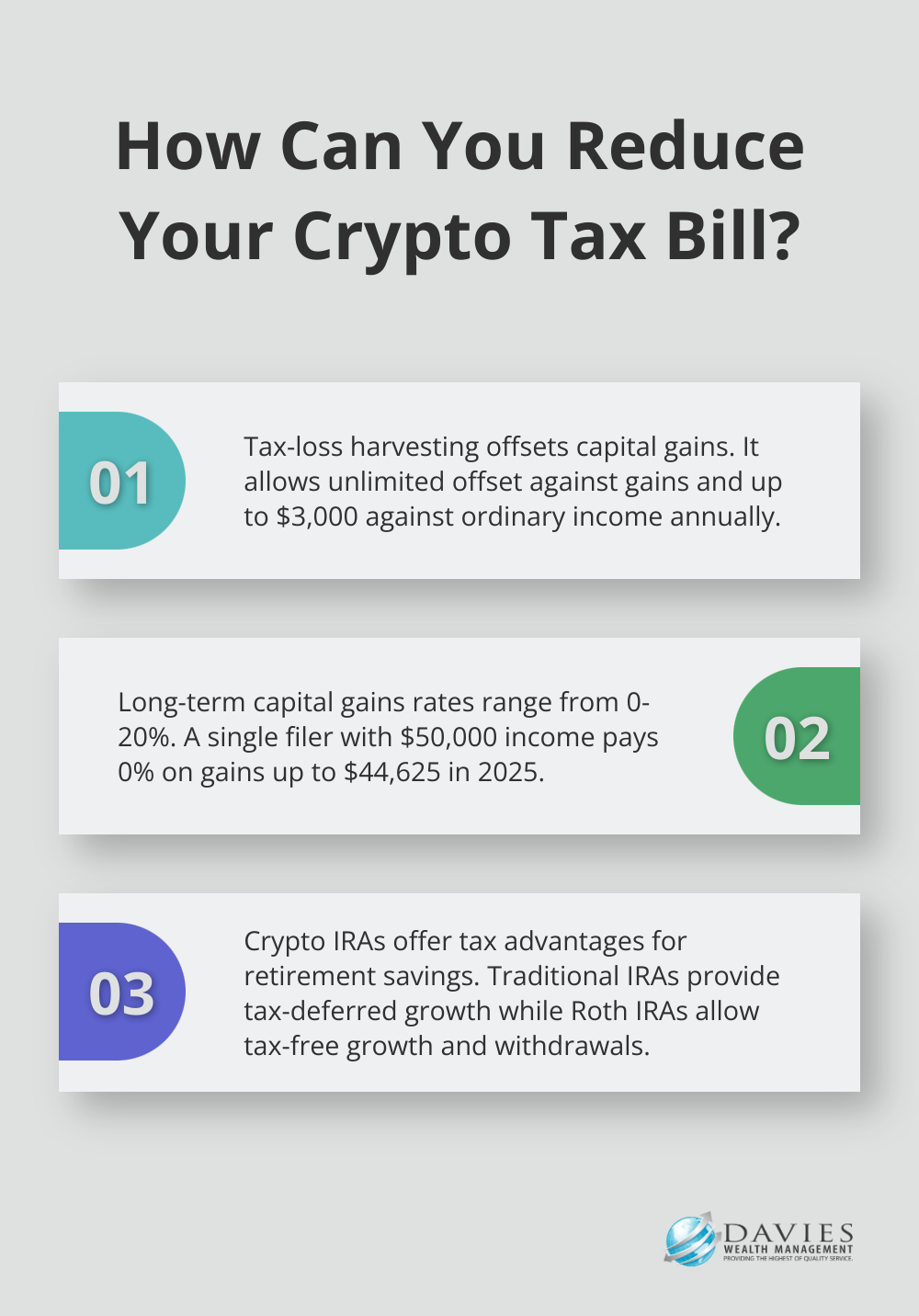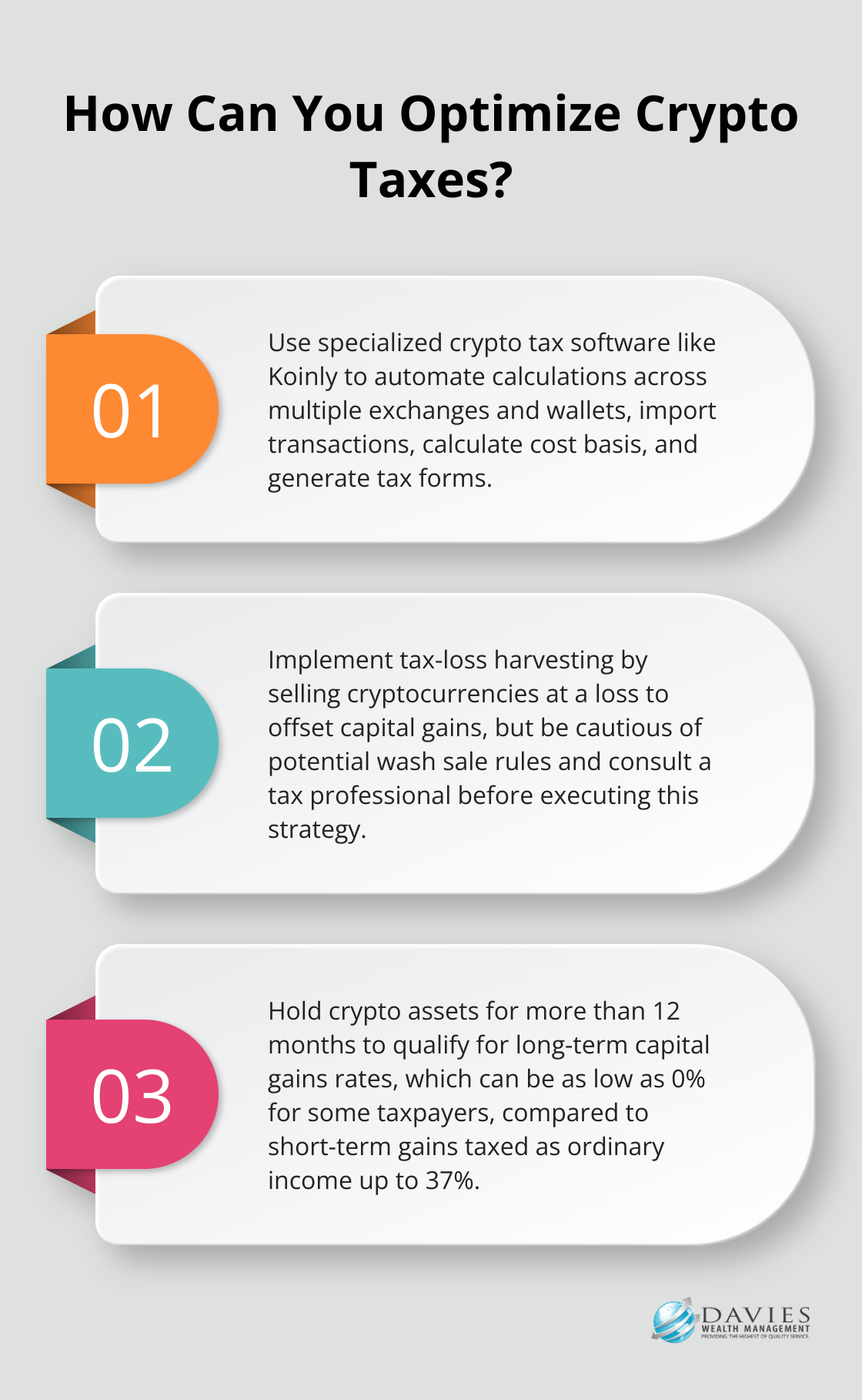Cryptocurrency has revolutionized the financial landscape, but it’s also introduced new complexities in tax reporting. At Davies Wealth Management, we understand the challenges investors face when navigating the intricate world of crypto taxation.
This guide will explore effective crypto tax strategies to help you optimize your financial outcomes and stay compliant with evolving regulations. We’ll cover essential tactics, from tax-loss harvesting to leveraging long-term capital gains rates, empowering you to make informed decisions about your digital asset investments.
What Are the Basics of Crypto Taxation?
Cryptocurrency taxation presents complex challenges, but a solid grasp of the fundamentals proves essential for effective financial planning. The IRS classifies cryptocurrency as property, which impacts how various actions trigger tax events.
Taxable Crypto Events
Several actions qualify as taxable events in the world of cryptocurrency:
- Selling crypto for fiat currency
- Trading one cryptocurrency for another
- Using crypto to purchase goods or services
- Receiving cryptocurrency as income (through mining, staking, or as payment)

Each of these actions is subject to taxation based on the fair market value at the time of the transaction.
Calculating Gains and Losses
When you dispose of cryptocurrency, you must calculate your capital gain or loss. This calculation involves subtracting your cost basis (the original purchase price plus any fees) from the sale price. For instance, if you purchased 1 Bitcoin for $30,000 and sold it for $40,000, your capital gain would amount to $10,000.
The holding period significantly affects the tax rate applied to your gains. Assets held for more than a year qualify for more favorable long-term capital gains rates (which can be as low as 0% for some taxpayers).
The Importance of Meticulous Record-Keeping
Accurate record-keeping stands as a non-negotiable aspect of crypto taxation. The decentralized nature of cryptocurrencies means no single institution tracks all your transactions for you. You must maintain detailed records of every purchase, sale, trade, and receipt of cryptocurrency. These records should include dates, amounts, and the fair market value in USD at the time of each transaction.
Specialized crypto tax software can automate this process, importing transaction data from various exchanges and wallets. This automation significantly reduces the risk of errors in reporting. However, regular review of these records remains crucial to ensure completeness and accuracy.
The burden of proof lies with the taxpayer in case of an audit. Inadequate record-keeping can result in penalties and additional taxes owed. Thorough documentation not only ensures compliance but also positions you to take advantage of tax-saving opportunities (such as tax-loss harvesting).
Advanced Tax Optimization Strategies
Understanding these basics of crypto taxation sets the foundation for more sophisticated tax optimization strategies. As the crypto landscape continues to evolve, staying informed and seeking professional guidance can make a substantial difference in your overall tax liability.
The next section will explore specific strategies to minimize your crypto tax liability, including tax-loss harvesting and leveraging long-term capital gains rates. These tactics can help you navigate the complex world of crypto taxation more effectively and potentially reduce your tax burden.
How to Slash Your Crypto Tax Bill
Minimizing your cryptocurrency tax liability requires a strategic approach. Several effective methods can help you reduce your crypto tax burden while maintaining compliance with IRS regulations.
Harness Tax-Loss Harvesting
Tax-loss harvesting is a powerful strategy for crypto investors. This technique involves selling cryptocurrencies at a loss to create a capital loss to offset it against their capital gains and reduce their overall tax bill. The IRS allows you to offset an unlimited amount of capital gains and up to $3,000 of ordinary income per year with crypto losses.

It’s important to be aware of the wash sale rule, which prohibits repurchasing the same or substantially identical security within 30 days of the sale. While this rule doesn’t explicitly apply to cryptocurrencies as of 2025, it’s wise to exercise caution and consult with a tax professional before implementing this strategy.
Leverage Long-Term Capital Gains Rates
Holding your crypto assets for more than 12 months can significantly reduce your tax burden. Long-term capital gains for cryptocurrencies are taxed at preferential rates between 0-20% (depending on your income bracket). These rates are substantially lower than short-term capital gains rates, which are taxed as ordinary income (up to 37% in 2025).
A single filer with a taxable income of $50,000 in 2025 would pay 0% on long-term capital gains up to $44,625. This presents a substantial opportunity for tax savings compared to short-term gains, which would be taxed at 22% for the same income level.
Explore Crypto IRA Options
Investing in cryptocurrency through a self-directed IRA can provide significant tax advantages. If you’re determined to invest in cryptocurrency, avoiding hefty capital gains taxes may be possible by including digital currencies in retirement accounts. Traditional IRAs offer tax-deferred growth, meaning you won’t pay taxes on your crypto gains until you withdraw funds in retirement. Roth IRAs, on the other hand, allow for tax-free growth and withdrawals in retirement (provided you meet certain conditions).
Several companies now offer crypto IRA services, allowing you to hold Bitcoin, Ethereum, and other cryptocurrencies in your retirement account. However, it’s essential to understand the risks and regulations associated with these investments. The IRS prohibits self-dealing and certain types of transactions within IRAs, so careful planning is necessary.
Maximize Charitable Donations with Cryptocurrency
Donating cryptocurrency to qualified charities can be a win-win strategy for tax optimization. When you donate crypto that you’ve held for more than a year, you can deduct the fair market value of the donation from your taxes without paying capital gains tax on the appreciation. This approach can lead to significant tax savings, especially for highly appreciated assets.
If you donate Bitcoin worth $10,000 that you purchased for $2,000, you could potentially deduct $10,000 from your taxes while avoiding capital gains tax on the $8,000 appreciation. It’s important to ensure that the receiving organization is equipped to handle cryptocurrency donations and can provide proper documentation for tax purposes.
Implementing these strategies requires careful planning and execution. Professional guidance can help you navigate the complexities of crypto taxation and optimize your overall financial plan. As you consider these tax-saving methods, it’s equally important to have the right tools and resources at your disposal for effective crypto tax management.
Mastering Crypto Tax Tools
Crypto Tax Software: A Game-Changer
Crypto tax software simplifies the complex process of managing digital asset taxes. Platforms like Koinly automate calculations across multiple exchanges and wallets. These tools offer transaction importing, cost basis calculations, and tax form generation. Koinly is considered the best overall tax software tool and is also best for TurboTax integration. For those with fewer than 20 trades, Bitcoin.tax offers the best free software option. The key is to select a platform that supports your specific cryptocurrencies and exchanges.
Blockchain Explorers: Your Transaction Verification Ally
Blockchain explorers serve as indispensable tools for transaction verification and tax information gathering. These tools allow users to input transaction hashes and retrieve detailed transfer information. Blockchain explorers excel at tracking transactions that exchanges might miss, such as peer-to-peer transfers or DeFi protocol interactions. By utilizing blockchain explorers, investors ensure a complete record of all taxable events, potentially avoiding unreported income or gains.
Crypto-Savvy Tax Professionals: Your Strategic Partners
While software handles much of the heavy lifting, crypto-savvy tax professionals provide irreplaceable expertise. These specialists stay current with the rapidly evolving regulatory landscape and offer tailored advice for complex situations. Crypto tax professionals offer strategic planning beyond mere compliance. They identify opportunities for tax-loss harvesting, advise on the tax implications of different trading strategies, and ensure you take advantage of all available deductions and credits. Their expertise proves particularly valuable in navigating the intricate world of cryptocurrency taxation.
Choosing the Right Tools for Your Needs
The selection of crypto tax tools depends on your individual circumstances. Consider factors such as the volume of your transactions, the complexity of your investments, and your comfort level with technology. For casual investors with straightforward transactions, a user-friendly tax software might suffice. However, active traders or those involved in complex DeFi protocols will benefit from a combination of robust software and professional guidance.
The Role of Continuous Education
The crypto tax landscape evolves rapidly. Stay informed about changes in regulations and new tools that emerge. Subscribe to reputable crypto tax newsletters, attend webinars, and engage with online communities focused on cryptocurrency taxation. This ongoing education empowers you to make informed decisions and adapt your tax strategy as needed.

Final Thoughts
Effective crypto tax strategies require a strategic approach and understanding of the evolving regulatory landscape. Investors can optimize their tax outcomes through methods like tax-loss harvesting, long-term capital gains rates, and crypto IRA options. These tactics, combined with meticulous record-keeping and specialized tools, form the foundation of robust crypto tax management.

The cryptocurrency market’s dynamic nature demands ongoing education and adaptability. Investors must regularly reassess their strategies to ensure compliance and maximize tax efficiency. Staying informed about the latest developments in crypto tax regulations is essential for success in this rapidly changing field.
Davies Wealth Management offers expert guidance through the intricacies of crypto tax planning. Our team provides personalized advice tailored to your specific financial situation, aligning your crypto investments with your overall wealth management goals. Partner with Davies Wealth Management to navigate the complexities of crypto taxation and build a secure financial future in the digital age.



Leave a Reply